Protect Your Health From Smoke in the Air
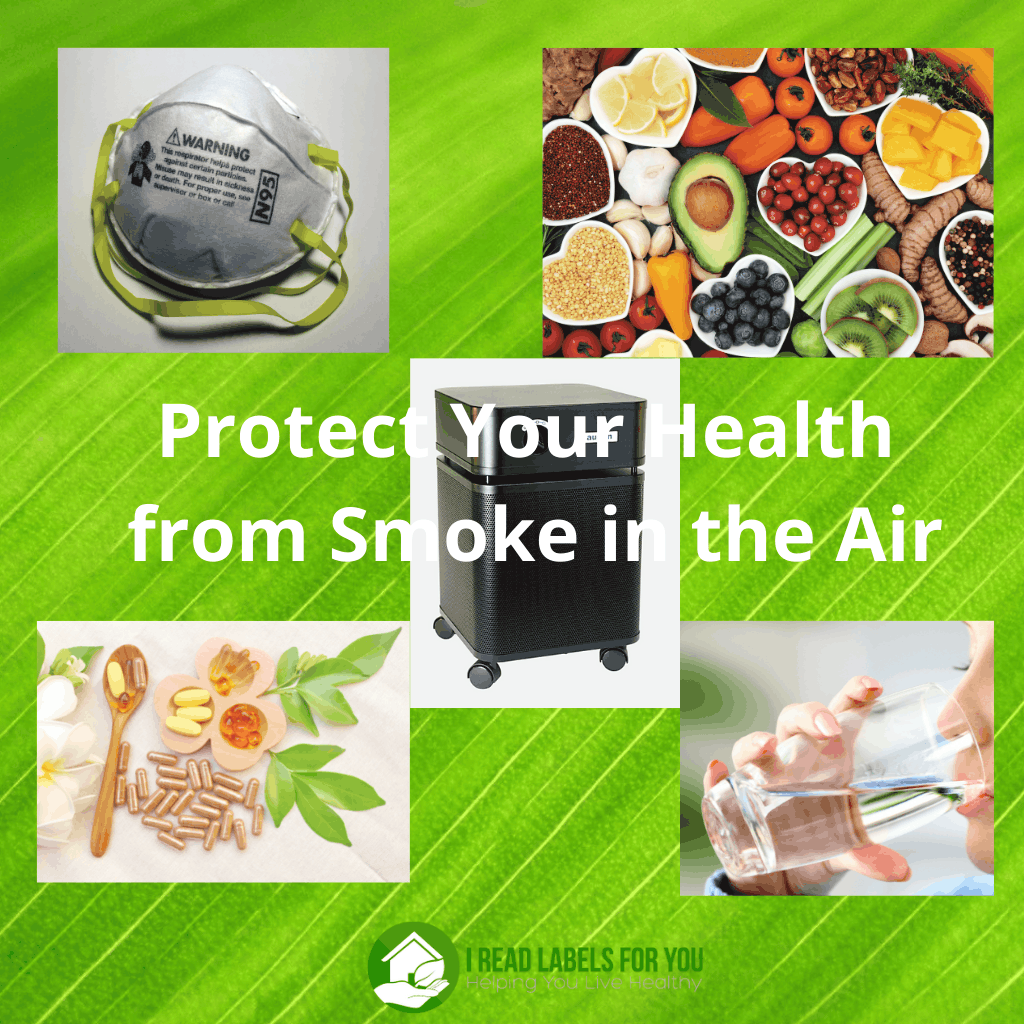
When I hear news about wildfires anywhere on our planet, my heart goes out to the people and animals there. I know what it is like, I’ve been there. Indeed, smoke from wildfires was one of the reasons I left my beloved California after 22 years of living there. While fires cause multiple issues, this post focuses on one in particular – your health. Specifically, you will learn about several ways to protect your health from smoke in the air. Stay with me to find out what I do to improve indoor air quality and strengthen my immune system.
In this post:
- The subject of health care is personal to me.
- Smoke in the air may cause serious health problems.
- Wear a particulate respirator to shield your lungs from particulate matter in smoke in the air.
- Hydrate to protect your health from smoke in the air.
- Eat foods with antioxidants to protect your health.
- Consult your doctor about using supplements (and what I am using).
- Run a portable air purifier to improve your indoor air.
- Choose a mobile air purifier that works for both particles and gases.
- The best filter medium for gases in smoke in the air is activated carbon (and discount!).
- Summary of the ways to protect your health from smoke in the air
The subject of health care is personal to me.
The topic of health protection is personal to me because of the experience I have had in life. Sadly, my dad died of metastatic cancer in his fifties, so I’m not going to give this disease a chance. Besides, I have recovered from Hashimoto’s Thyroiditis autoimmune disease and am on the way to a complete recovery from Addison’s. (See Can Breast Implants Cause Autoimmune Diseases and My Health Update after Explant Surgery.)
Concerns for my health motivated me to start my blog in 2012. I wanted to share everything I learned about toxic chemicals and their potentially negative health effects. My premise is that knowledge empowers us and allows us to make informed decisions about purchases and lifestyle.
Thus, since 2012, I have created several e-books, founded the Savvy Consumer Circle, won an award, and written hundreds of posts for my blog. In addition, I have worked as a product and ingredient consultant for companies that value my opinion. Finally, Myrto Ashe MD, MPH, IFMCP has reviewed many of my posts, including this one, for medical accuracy.
Before passing judgment on a product, I study its ingredients using extensive resources, such as scientific reports and chemical databases. Plus, I follow a multi-step approach to research I established based on the principles of thoroughness, honesty, and integrity. Check out my Start here page to learn more about my reference sources and research.
So, today you will learn what can help you protect your health from smoke and breathe clean air.
Smoke in the air may cause serious health problems.
To begin, all smoke includes particles and gases, most of which are associated with increased cancer risks (source). Namely, these substances are:
- ash
- soot
- carbon monoxide
- carbon dioxide
- sulfur dioxide
- polycyclic aromatic hydrocarbons (PAHs)
- benzene
- metals
- dioxins.
My functional doctor Myrto Ashe, MD (who lives in California and experiences annual wildfire smoke) says:
Some of these cause a type of internal “rust” called oxidative stress. This can lead to any number of diseases, most commonly cardiovascular disease, such as heart attacks, and also type 2 diabetes. Basically, you get older faster.
The best studied are the particles in smoke: these come in different sizes. The best known are the ones that are smaller than 2.5 microns, called PM2.5. But there are also smaller particles down to 0.03 microns, and gases. The health effects of some of these are less well understood. But we know that the very small particles get into all your organs because they can diffuse like gases across your lung alveoli. Gases like VOCs are also known to be harmful to health.
Further, smoke can affect your eyes, nose, throat, and lungs, cause coughing and wheezing, and interfere with your breathing. Hence, inhaling wildfire smoke may be especially harmful for people with asthma, lung disease, and heart disease (source).
Also, recent studies found a link between exposure to fine particulate matter (PM2.5) in wildfire smoke and increased COVID-19 cases and deaths.
Here is what you can do to protect your health from smoke in the air.
Wear a particulate respirator to shield your lungs from particulate matter in smoke in the air.
For your information, a government website called Air Now informs you of the air quality in your ZIP code. You can also decide on the measures of protection fit for your area based on your air quality index.
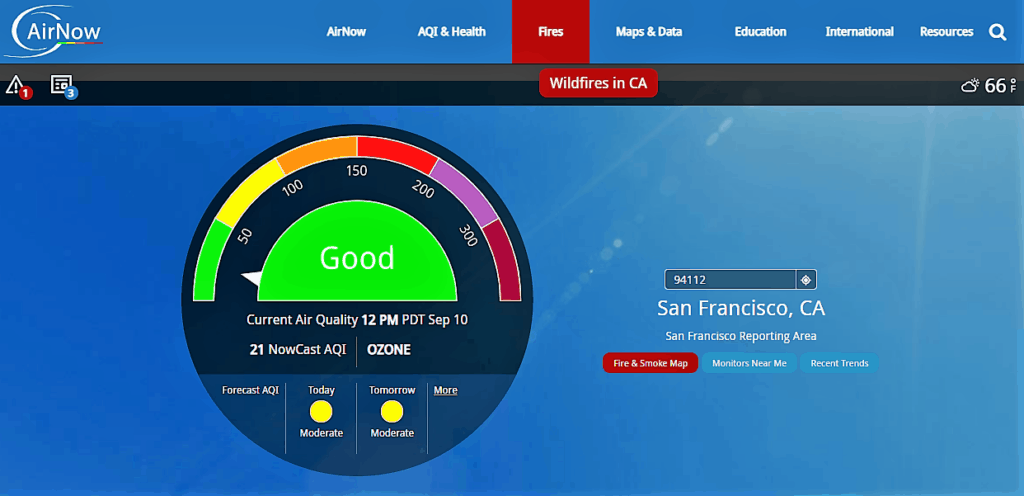
For outdoors, you can wear a special mask called a “particulate respirator.” The right one should have the word “NIOSH” and either “N95” or “P100” printed on it. To clarify, NIOSH stands for the National Institute for Occupational Safety and Health, and 95 and 100 are the mask ratings. Thus, respirators that filter out at least 95% of airborne particles have a 95 rating; those that filter out at least 99% receive a 99 rating; and those that filter at least 99.97% receive a 100 rating (source).
Also, according to the California Department of Public Health, the respirator should have two straps that go around your head. In other words, one-strapped respirators or those with straps hooking over the ears will not do. Plus, the respirator must fit over your nose and under your chin and seal tightly to your face.
Importantly, the California Department of Public Health warns against using bandanas, paper or surgical masks, and tissues held over the mouth and nose. Reportedly, they do not protect your lungs from wildfire smoke.
If you are looking for an approved particulate respirator, check out this Amazon page.
Hydrate to protect your health from smoke in the air.
Staying hydrated during smoke season is crucial as fire smoke dehydrates the body, and water flushes out toxins. Plus, you need to hydrate yourself to compensate for any diuretic (dehydrating) drink, e.g., green tea. Consequently, the quality of your drinking water is important.
After I discovered uranium in water in our house, I could no longer hold off buying an effective water filter. (See my post Best Water Filter System for You for the results of my extensive research and comparative brand analysis.)
Personally, I have been using a Pure Effect water filter for a while now and stand by its quality. First, it is as powerful as Reverse Osmosis (RO), but it does not demineralize water. Second, it has no water storage tank, which means there is no plastic in long contact with water. In addition, Pure Effect offers a Shower Water Filter that filters chlorine, chlorination by-products, VOCs, hydrogen sulfide, and radon. This is more than most shower filters I have seen.
Now, if you must evacuate or travel during smoke season, you might not have access to filtered water. The quality of bottled water is poorly regulated, and it is normally packaged in plastic.
But the good news is that this filtration water bottle by Aquasana may be just what you need. Indeed, it filters not only chlorine but also bacteria, chlorine-resistant cysts like giardia and cryptosporidium, and heavy metals. I use it when I travel to cut down on bottled water.
Eat foods with antioxidants to protect your health.
Here are some helpful tips on dealing with smoke in the air from my functional doctor Myrto Ashe, MD:
I would recommend people focus more on diet. Antioxidants are in colorful fruits, vegetables, nuts, and seeds. So, now is the best time ever to focus on the “colors of the rainbow,” with something from each category (yellow, orange, red, green and brown/tan) every day. For total amounts, I would say 5-10 cups of produce daily. Also, I would focus on darker foods, blueberries, blackberries, black rice, purple potatoes, cocoa nibs, dark chocolate, and lots of spices, and herbs. Plus, you want 4 cups of green tea daily.
Of course, there are subtleties here. For example, wild blueberries are much better as they are small and purple all the way through.
In addition, Endangered Species chocolate has more flavanols than Green and Black’s. Other brands may also be great, but they have not all been tested.
You may want to consider superfoods like acai, maqui powder, chia seed, mulberries, goji berries, and make some smoothies.
Thus, diet is a way to protect your health from smoke in the air.

Consult your doctor about using supplements (and what I am using).
The tip my functional doctor Myrto Ashe, MD shares about supplements is as follows:
In terms of supplements, we know N-acetyl cysteine helps patients with lung disease. Omega 3s, probiotics, and magnesium are anti-inflammatory. I personally will add some Meriva or Longvida curcumin, and some acetyl or liposomal glutathione. (source)
CocoaVia is an interesting product that is extremely high in flavanols while also being very low in heavy metals such as cadmium.
I buy some of my supplements from Seeking Health. There are many things I like about Seeking Health, including a bioavailable form of folate they offer.
However, some of their products have a California Proposition 65 warning due to “natural ingredients.” Our planet is polluted, and heavy metals occur naturally in soil, water, and plants. And some of their products have “natural flavors,” which I do not like because of potentially harmful undisclosed ingredients.
Among Seeking Health Supplements that meet my safety criteria for inactive ingredients and heavy metals, I have some favorites. Note, though, that I am not a medical doctor. So, please talk to your doctor about supplements that are right for you.
For instance, Magnesium Malate Powder has no dyes, artificial or natural flavors, no gluten, or any other filler ingredients. Also, I take this N-Acetyl-L-Cysteine that helps me support my respiratory health and strengthen my immune system. (They have Prenatal Vitamins, too, if you are interested.)
Run a portable air purifier to improve your indoor air.
Obviously, the best way to protect your health from smoke in the air is to stay home. If your air quality index reads “unhealthy,” it is a good idea to run your indoor air cleaner.
Actually, the government agencies, such as the EPA and California Air Resources Board, refer to air purifiers as “air cleaners.” It is because they clean the air to a certain extent but do not purify it 100%. At the same time, the portable air cleaner industry calls them “air purifiers.” Therefore, for this post to be easily found on the Internet, I will call them “air purifiers” as well.
Also, know that HVAC filters (i.e., add-ons to your furnace and air conditioner) do not protect you fully because they filter out particles, not gases and odors (source).
It is hard to find a perfect portable air purifier, because a perfect one would filter out the ultrafine particles as small as possible, as well as gases. And you also want a machine that circulates enough air to work properly in the space you have in mind.
Air purifiers are sometimes rated for Clean Air Delivery Rate, or CADR. However, the CADR rating system is for particles only (source). It does not rate a unit’s ability to eliminate gases with carbon (such as those in wildfire smoke).
Ultimately, no portable air purifier or filter can eliminate all air pollutants in your home. Yet, they are a good way to protect your health from smoke in the air.
Choose a mobile air purifier that works for both particles and gases.
Specifically, air purifiers should include two technologies:
- a high-efficiency particulate air filter (HEPA) to capture particles
- activated carbon to adsorb gases
After 22 years of living in California, I moved to Colorado with my family. In large measure, we did it to escape forest fires and their constant smoke and ash, which can last for months during the year. Unfortunately, the air is not always good in Colorado either. Hence, for the sake of air quality improvement, I bought an Austin Air purifier. Its filters remove 95% of all particles 0.1 microns and larger as well as the gases of the wildfire smoke. (If you are looking for an air purifier to remove particles as small as 0.003 microns, please learn more here.)
Before deciding on an air cleaner brand, I spent a good amount of time researching the indoor air purifier industry. Among other things, I wanted to know how air purifiers work and what filter materials clean the air most effectively. Additionally, I wanted an air purifier made in the USA. Then, I compared air purifiers of several popular brands and got a winner! Please, read my Comprehensive Guide to Mobile Air Purifiers to choose the one that will help you protect your health.
The best filter medium for gases in smoke in the air is activated carbon (and discount!).
Reportedly, activated carbon is the ultimate material that handles gases, including fire smoke. Thus, the EPA states the more activated carbon in a carbon air purifier, the better. For example, Air Doctor models contain between 0.6 and 3.3 lbs of activated carbon, and two of IQ Air models contain 5 and 12 pounds.
Alternatively, three Austin Air purifier models contain 15 pounds of carbon. This makes them absolutely superior for gases such as those in wildfire smoke.
Additionally, the Austin Air purifier does not use oxidation and ionization, which can produce ozone. The California Air Resources Board tested Austin Air cleaners and found that they did not emit any ozone. Sadly, ozone is toxic because it can trigger allergies, asthma, COPD, and decrease lung function.
For the reasons above, I chose an Austin Air activated carbon air purifier for wildfire smoke. It covers approximately 1,500 sq. ft. depending on your ceiling height. Plus, Austin Air offers a 30-day money-back guarantee, a 5-year warranty, and filter replacement only every 5 years.
In fact, I like Austin Air purifiers so much that I signed up to be their dealer. Therefore, you have an opportunity to buy an Austin Air purifier from me at a significant discount and with free shipping. Just email me and I will walk you through the process. By the way, this is the first time I have decided to become a dealer for a product. That is how much I believe in it!
Summary of the ways to protect your health from smoke in the air
To sum up, I suggest five major ways to protect yourself from smoke:
- wearing a particulate respirator outdoors to shield your lungs from smoke
- hydrating to detoxify your body
- focusing on foods with antioxidants
- taking supplements if your doctor permits
- using an indoor air cleaner with a HEPA filter and an activated carbon filter.
To make sure your drinking the water is clean, consider purchasing a water filter (e.g., Pure Effect) and/or a filtration water bottle.
As for air purifiers, in my opinion, the best ones are Austin Air purifiers. For smoke, go for the models with 15 lbs of activated carbon. Specifically, Healthmate Plus targets wildfire smoke to the maximum. For details on the models, check out Austin Air purifiers in my shop.
To buy an Austin Air purifier at a DISCOUNT and with FREE SHIPPING, email me, Irina Webb.
Also, my research indicates that the best air purifier for ultrafine particulate matter (PM 0.1) is Air Doctor. It is because its filter deals with particulates down to 0.003 microns. However, it is not the best for gases.
You can learn more about Air Doctor and Austin Air models as well as other popular brands in my Comprehensive Guide to Mobile Air Purifiers.
Please remember that any air purifier (as long as it emits no harmful substances) is better than none.
Visit my shop, check out my e-books, book a consultation with me, and/or join my Savvy Consumer Circle.
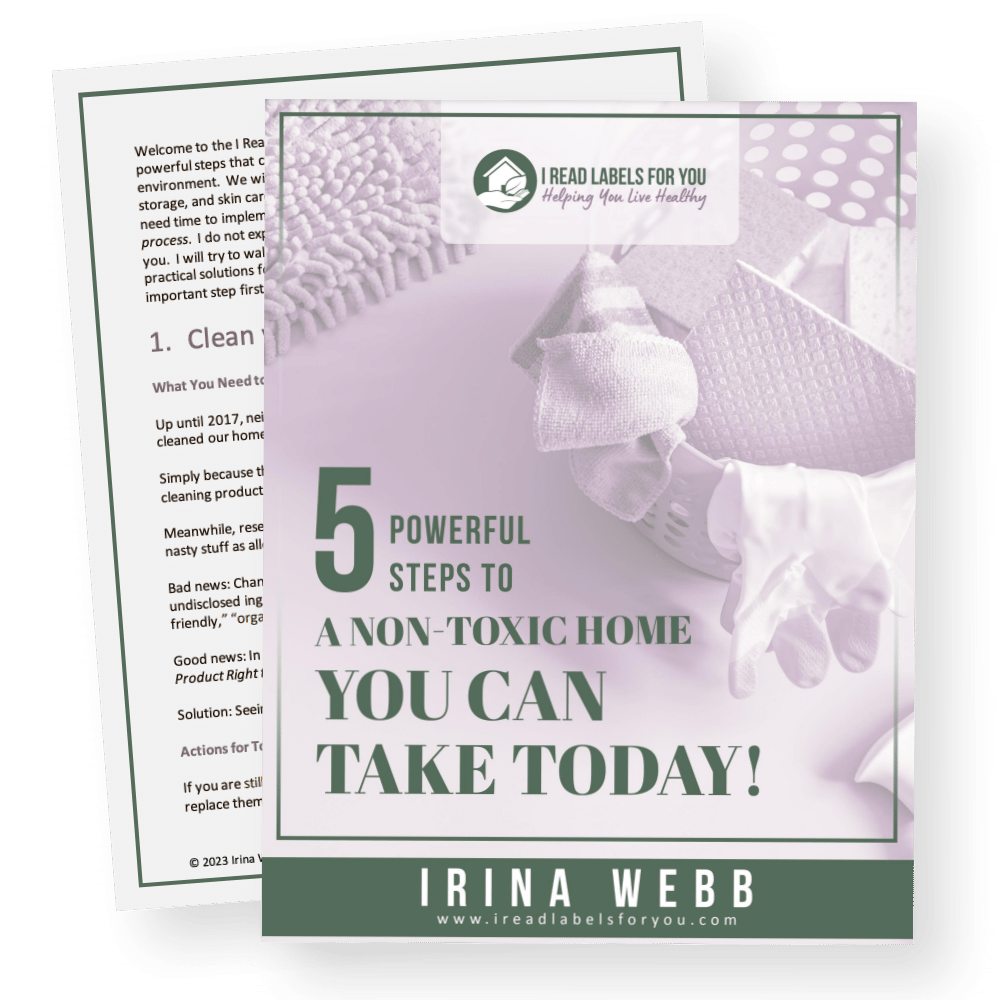
Download The Free Guide!
5 Powerful Steps To A Non-Toxic Home
Join our informed consumer community and get our free guide the “5 Powerful Steps To A Non-Toxic Home”.

 Written by
Written by  Health-related claims have been reviewed by
Health-related claims have been reviewed by 
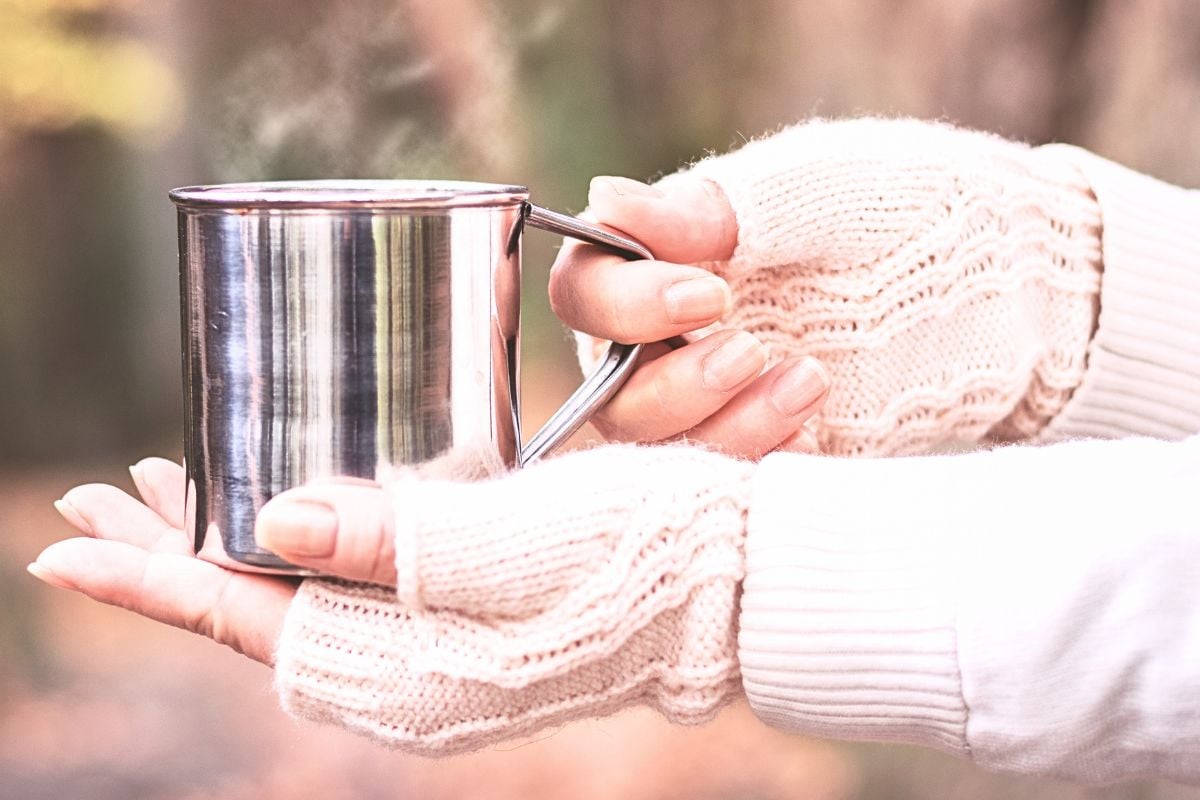

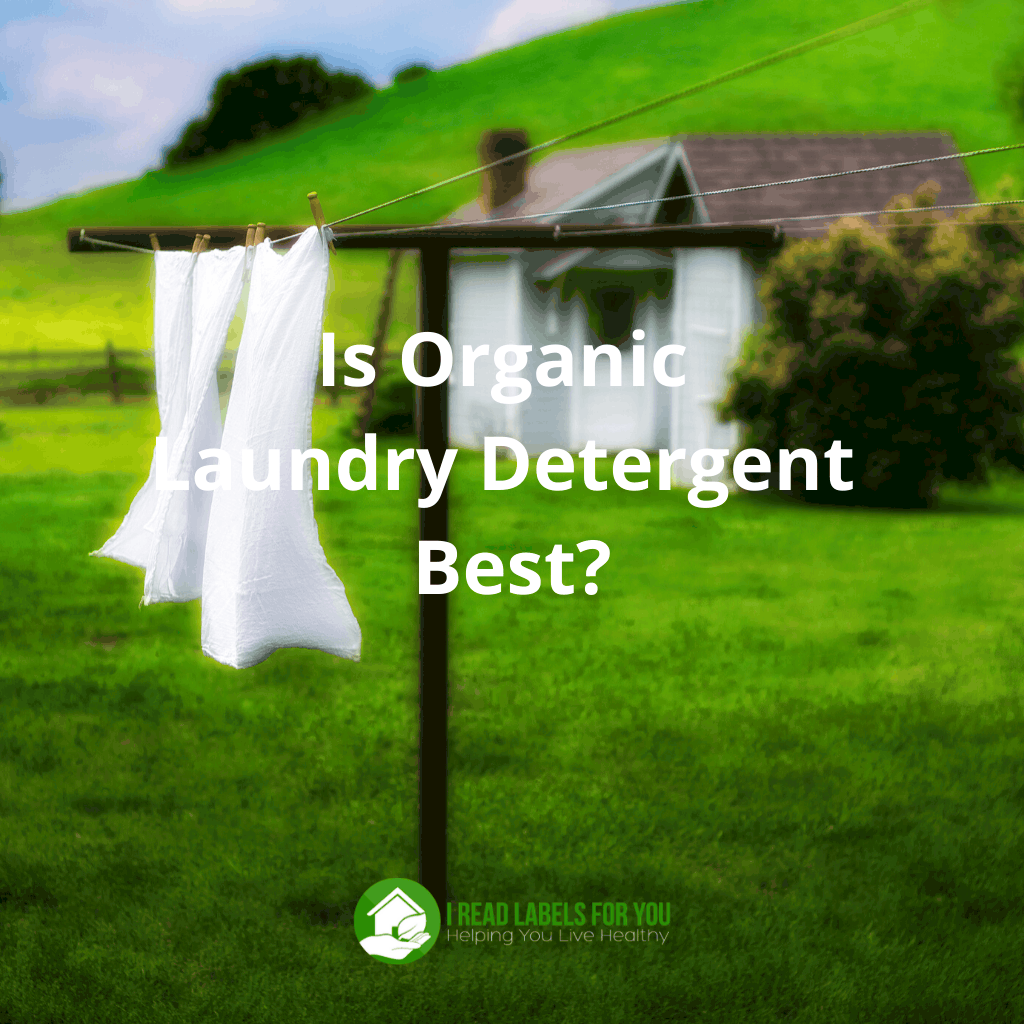
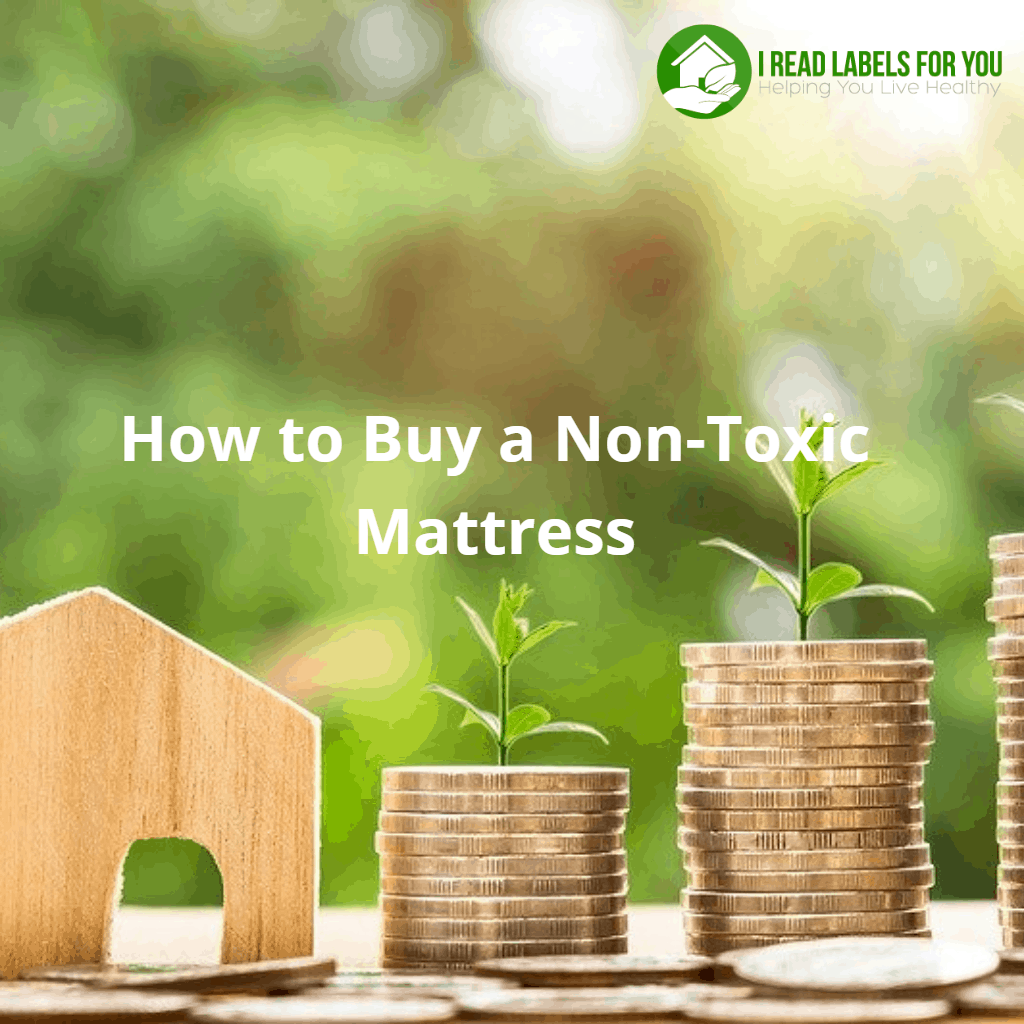

Thank you for all the amazing info you provide on your site!
Question about Austin:
What do you think about them using Zeolite in the carbon? Also, i read a few reviews saying that they actually release back a bit of VOCs. Have yo heard anything about it? (about the Austin off gassing).
Thank you.
Hi, Maria: regular change of filters should prevent any off-gassing. I can refer you to a very knowledgeable dealer who can answer all your further questions. ~Irina
What brand do you/your doctor recommend for Meriva or Longvida curcumin?
Irina, your links for some of the supplements aren’t working, just an FYI.
Thank you, Angela! ~Irina
What kind of air filters do you recommend for your HVAC unit? Is there a safer brand over another?
It’s a complex topic, Colleen. One size doesn’t fit all. We can talk about that in a consultation. ~Irina
Hello Irina,
Since this is the only article I found where you mentioned supplements and fish oil I thought of leaving my question here. Forgive me for the long post. Sometime early this year, I had begun to research more about what I could add to my diet to help boost my dental health and had come across videos and blogs which advocated Dr Weston Price’s theories in his book titled Nutrition and Physical degeneration. To consume more fat soluble vitamins. With cod liver oil being a great option. I never bought any kind of fish oil before at that point, and somehow after a lot of research I came across Rosita Cod Liver oil. I haven’t come across an article of yours that talked about supplements specifically? So Im not sure if you avoid them because food is superior to what the market offers these days, with a lot of them being actually synthetic and not natural at all. However, Rosita claims its the only true cod liver oil in the market and it almost seems too perfect to be true to me, theres no synthetic additves or preservatives, no heat, no added vitamins (its all straight from the fish). They even claim to be using an ‘ancient extraction’ method to produce this. Its nitrogen flushed and oxygen free, meaning they claim it can be shipped in very hot weather without getting spoiled. I actually bought this oil twice, one was last winter, so I didn’t know how to trust how much it wouldnt spoil this summer, so I got another one when it was around 40 degrees celsius outside. When I received it, the bottle was really really warm, but it did not have even a slight change of taste. I honestly do not even know what other fish oils taste like. But this one is very raw to me. They often pair it with Emu oil capsules for its vitamin K contents. There’s other different health products on there that all seem to be highly natural or even raw in comparison to others you’d find in a store, so I’m honestly baffled that something like this exists in the market of supplements. I’m curious about your take on this personally because I haven’t seen you discuss this topic in specific. Therefore I would appreciate it greatly if you checked this out.
Thank you for your time, and I admire your great efforts in helping others change and improve their lives no matter their position.
-Wafa
Dear Wafa:
Thank you for your question. I do not specialize in supplements and vitamins, at least not yet. 🙂 Luckily, we have a lot of functional and integrative medical professional for that. When I was at the integrative oncology conference last month, I attended one workshop on how to understand supplement labels. There is a whole science behind it. We will see if there is enough demand from my followers, I might get into that. But that would require a lot of time investment on my part. For now, I can just tell you which brands I use for me and my family if you are interested. I hope you had a relaxing Thanksgiving! ~Irina
Great information! thank you Irina